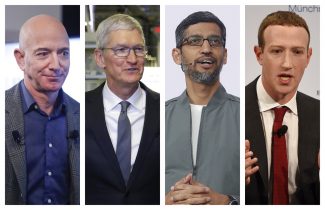

Commentary
I am writing on May 9, Mothers’ Day in the United States.
I used to look askance at the holiday, not because I have anything against mothers—on the contrary—but because it always seemed like a Hallmark Holiday, something manufactured by corporate interests and glazed in a sugar of sentimentality from which one could free oneself only by a tithe of flowers and/or luncheon for the mothers in one’s life.
Lately, however, I have become a staunch partisan of the holiday.
This is not because I doubt the cynicism of the interests encouraging us to splurge on cards, flowers, chocolates, and luncheons, but rather the wardens of wokeness have finally got around to canceling the very idea of motherhood.
Thus we have Congresswoman Ayanna Pressley calling for an expansion of Medicaid to include “coverage for birthing people.”
“Birthing people.”
Pressley is a freak, granted. But she is not alas an anomaly among our elected representatives. Consider the words of her colleague Congresswoman Cori Bush: “Black birthing people and our babies die because our doctors don’t believe our pain.”
All this was fodder for fun today as various commentators—and The Babylon Bee, of course—weighed in to ridicule the ridiculous.
“Birthing people.”
Funny, isn’t it? Preposterous. But remember, this language is coming out of the mouths of the people we have elected to govern us.
What does that tell us about them? What does it tell us about ourselves?
The rejection of the word “mother” is part and parcel of a much larger rejection—a rejection of human reality as traditionally conceived.
And remember that one of the first acts of Joe Biden’s administration was to insist that all federal agencies query people about their “preferred pronouns.” (I have always suspected that Biden’s preferred pronoun was “Xi,” but that is a different topic.)
And Nancy Pelosi, the Speaker of the House, third in line to the Presidency, took the spoon with chocolate ice cream out of her mouth long enough to issue her own linguistic carnage, including the rules that would replace such terms as “mother,” “father,” “daughter,” “son,” “sister” and “brother” with “gender neutral” terms like “parent,” “child,” and “sibling.”
There is a lot that could be said about the attempt to force gender specific terms into early retirement.
In this column, I’d just like to point out that it is not a new idea.
‘Mother’ as Blasphemous
Consider the picture of sexual relations in Aldous Huxley’s dystopian novel “Brave New World” (1932).
I do not myself regard “Brave New World” as a particularly accomplished work of literature.
But considered as a work of social-moral prognostication, it is a work of genius.
Perhaps the aspect of Huxley’s dystopian fable that is most frequently adduced is its vision of a society that has perfected what we have come to call genetic engineering.
Among other things, it is a world in which reproduction has been entirely handed over to the experts.
The word “parents” no longer describes a loving moral commitment but only an attenuated biological datum.
Babies are not born but designed according to exacting specifications and “decanted” at sanitary depots like The Central London Hatchery and Conditioning Centre with which the book opens.
As with all efforts to picture future technology, Huxley’s description of the equipment and procedures employed at the hatchery seems almost charmingly antiquated, like a space ship imagined by Jules Verne.
But Huxley’s portrait of the human toll of human ingenuity is very up-to-date.
I used to say that we had not—not quite, not yet—caught up with the situation he describes.
We did not, until very recently, inhabit a world in which “mother” and “monogamy” were blasphemous terms from which people have been conditioned to recoil in visceral revulsion.
But isn’t that precisely what the rhetoric of radicals like Pressley and Bush encourage?
Hatcheries
Thinkers as different as Michel Foucault and Francis Fukuyama have pondered the advent of a “posthuman” future, eagerly or with dismay, as the case may be.
Scientists busily manipulating DNA may give substance to their speculations.
It is often suggested that what is most disturbing about “Brave New World” is its portrait of eugenics in action: its vision of humanity deliberately divided into genetically ordered castes, a few super-smart Alpha-pluses down through a multitude of drone-like Epsilons who do the heavy lifting.
Such deliberately instituted inequality offends our democratic sensibilities.
What is sometimes overlooked or downplayed is the possibility that the most disturbing aspect of the future Huxley pictured has less to do with eugenics than genetics.
That is to say, perhaps what is centrally repellent about Huxley’s hatcheries is not that they codify inequality.
Nature already does that more effectively than our politically correct sensibilities like to acknowledge.
Rather, what is repellent is the idea that the hatcheries should exist at all.
Are they not a textbook example of Promethean hubris in action? It is worth stepping back to ponder that possibility.
In the seventeenth century, René Descartes predicted that his scientific method would make man “the master and possessor of nature.”
Are we not fast closing in on the technology that proves him right?
Progress?
And this raises another question.
Is there a point at which scientific development can no longer be described, humanly, as progress?
We know the benisons of technology. Consider only electricity, the automobile, modern medicine. They have transformed the world and underscored the old observation that art, that “techne,” is man’s nature.
Nevertheless, the question remains whether, after two hundred years of breathtaking progress, we are about to become more closely acquainted with the depredations of technology.
It would take a brave man, or a rash one, to venture a confident prediction either way.
For example, if, as in “Brave New World,” we manage to bypass the “inconvenience” of human pregnancy altogether, ought we to do it? (Note the moral adumbration of the word “ought.”)
If—or rather when—that is possible (as it certainly will be, and soon), will it also be desirable?
If not, why not?
Why should a woman go through the discomfort and danger of pregnancy if a fetus could be safely incubated, or cloned, elsewhere?
Wouldn’t motherhood by proxy be a good thing—the ultimate labor-saving device?
Most readers, I think, will hesitate about saying yes.
What does that hesitation tell us?
Some readers will have no hesitation about saying yes; what does that tell us?
Culture as Dangerous
As Huxley saw, a world in which reproduction was “rationalized” and emancipated from love was also a world in which culture in any traditional sense was not only otiose but dangerous, and hence severely policed.
This suspicion of culture is also a sub-theme of that other great dystopian novel, George Orwell’s “1984,” which ends with the work of “various writers, such as Shakespeare, Milton, Swift, Byron, Dickens,” being vandalized by being translated into Newspeak.
When that laborious propaganda effort is finally complete, the “original writings, with all else that survived of the literature of the past, would be destroyed.”
The point is that culture has roots. It limns the future through its implications with the past. Moving the reader or spectator over the centuries, in Hannah Arendt’s phrase, the monuments of culture transcend the local imperatives of the present.
They escape the obsolescence that fashion demands, the predictability that planning requires. They speak of love and hatred, honor and shame, beauty and courage and cowardice—permanent realities of the human situation insofar as it remains human.
The denizens of Huxley’s brave new world are designed and educated—perhaps his word, “conditioned,” is more accurate—to be rootless, without culture.
Ditto the denizens of Orwell’s nightmare totalitarian society.
In “Brave New World,” when a relic of the old order of civilization—a savage who had been born, not decanted—is brought from a reservation into the brave new world, he is surprised to discover that the literary past is forbidden to most of the population.
“But why is it prohibited?” asked the Savage. In the excitement of meeting a man who had read Shakespeare he had momentarily forgotten everything else.
The Controller shrugged his shoulders. “Because it’s old; that’s the chief reason. We haven’t any use for old things here.”
“Even when they’re beautiful?”
“Particularly when they’re beautiful. Beauty’s attractive, and we don’t want people to be attracted by old things. We want them to like the new ones.”
Huxley’s brave new world is above all a superficial world. People are encouraged to like what is new, to live in the moment, because that makes them less complicated and more pliable.
Sensations and Emotions
Emotional commitments are even more strictly rationed than Shakespeare. (The same, again, is true in “1984.”)
In the place of emotional commitments, sensations—thrilling, mind-numbing sensations—are available on demand through drugs and motion pictures that neurologically stimulate viewers to experience certain emotions and feelings.
The fact that they are artificially produced is not considered a drawback but their very point.
Which is to say that the brave new world is a virtual world: experience is increasingly vivid but decreasingly real.
The question of meaning is deliberately short-circuited.
“You’ve got to choose,” the Resident World Controller for Western Europe patiently explains to the Savage,
“between happiness and what people used to call high art. We’ve sacrificed the high art. We have the feelies and the scent organ instead.”
“But they don’t mean anything.”
“They mean themselves; they mean a lot of agreeable sensations to the audience.”
If this seems like a prescription for arrested development, that, too, is part of the point: “It is their duty to be infantile,” the Controller explains, “even against their inclination.”
Promiscuity is encouraged because it is a prophylactic against emotional depth.
The question of meaning is never pursued beyond the instrumental question of what produces the most pleasure.
Socrates told us that the unexamined life is not worth living. Huxley (yet again like Orwell) pictures a world in which the unexamined life is the only one available.
Huxley’s imagination failed him in one area.
He understood that in a world in which reproduction was emancipated from the body, sexual congress for many people would degenerate into a purely recreational activity, an amusement not inherently different from one’s soma ration or the tactile movies.
He pictured a world of casual, indeed mandatory, promiscuity. But he thought it would develop along completely conventional lines.
He ought to have known that the quest for “agreeable sensations” would issue in a pansexual carnival.
In this area, anyway, we seem to have proceeded a good deal further than the characters who inhabit Huxley’s dystopia.
Happy Mothers’ Day.
Roger Kimball is the editor and publisher of The New Criterion and publisher of Encounter Books. His most recent book is “Who Rules? Sovereignty, Nationalism, and the Fate of Freedom in the 21st Century.”
Views expressed in this article are the opinions of the author and do not necessarily reflect the views of The Epoch Times.





Be the first to comment